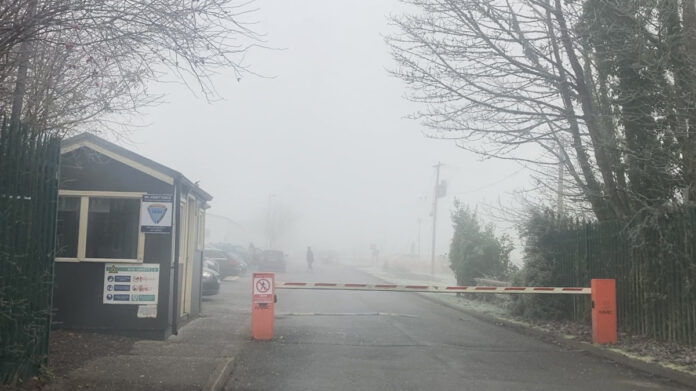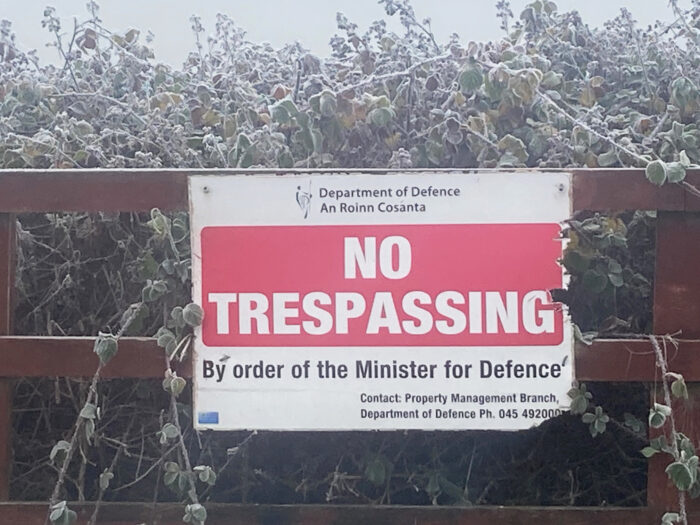
ALMOST 100 refugees endured sub-zero temperatures in tents at a former army camp outside Limerick City last night as there was no alternative accommodation available.
The international protection applicants (IPAs), who are living in the tents at the Knockalisheen Direct Provision Centre since last September, had complained about their living conditions, particularly during the present cold snap.
The men are living in “13 multi-purpose tactical shelter tents, each accommodating eight people on lands owned by the Office of Public Works”, said a spokesman for the Department of Children, Equality, Disability, Integration and Youth, which has responsibility for providing accommodation for asylum applicants.
Yesterday (Friday), 97 of the men remained in the tents – constructed by members of the Defence Forces last July – as there was no alternative accommodation available.
Local Fianna Fáil TD Cathal Crowe said it was “inhumane” to allow people to live in the tents.
Officials from the Department would “continue to seek accommodation solutions” for the men, who were being “prioritised to move to suitable accommodation as it becomes available”, said the spokesman.
He said the department was dealing with “significantly increased numbers of arrivals in the context of accommodation shortages and that the Department has no option but to consider all offers of accommodation.”
“There are 103 IPAs in this facility, however six will move to alternative accommodation”.
14,700 IPAs have arrived in Ireland over the past 12 months, including 13,600 since January 1, compared with an average 3,500 IPA arrivals between 2017 and 2019.
The tents are situated adjacent to the Direct Provision Centre which accommodates 200 asylum applicants at Knockalisheen.
Deputy Crowe, who lives near the site, said: “I have grave concerns. These tents are not appropriate accommodation, certainly not in winter months. I would consider that during wintertime, it is inhumane to have people in tents.”
Dr John Lannon, of migrant rights group Doras, said it was “pleased that the movement of people from the tents in Knockalisheen is getting underway, however the problem is that it has dragged on for months now for the men who are in Knockalisheen”.
Dr Lannon said he appreciated “that if there is a sudden surge of migrants, the tents are a little bit better than being left homeless on the streets, and that the tents may be called into use for a very short period of time”.
However, he added the men were in the tents for four months and “a sense of hopelessness” was setting in.
There are no bathroom facilities in the tents so the men have to walk to the nearby accommodation centre to wash and use toilets.
“It has a negative impact on their physical and mental well-being; there is no privacy or personal space. It is extremely cold and wet if they have to go outside to go to a toilet, at any time, but particularly at night.”
One source said that the men are sleeping in several layers of clothing “trying to keep warm”.

The department spokesman said: “Each tent is raised off the ground and has two fan heaters installed, and is subdivided into mini bedrooms.”
“Residents are on a full-board basis with the site operator providing a catering service. Resident use the main dining room, there are also two shower blocks with toilet and wash-hand basin facilities on site, and drinking water dispensers are provided.”
Clare Immigrant Support Centre co-ordinator, Orla Ní Éilí, said they were “very concerned” for the men’s mental and physical health.
“It’s just completely unsuitable, and it is causing an extra layer of anxiety and hardship for these people,” said Ms Ní Éilí.
“It is imperative to get all these people out of these tents. The government is in charge of this and it is not an option that should be used,” she added.
Deputy Crowe said he found the last few nights particularly cold.
“I’m living in a house with a central heating system and warm duvets, so I shudder to think what it’s like for people who are living in these tents”.
The Department spokesman said: “While the current reliance on emergency settings is less than ideal, these options are necessary to provide shelter to international protection arrivals and to prevent homelessness”.
“The Department is availing of all offers of accommodation, including the use of office buildings and sports facilities to address the accommodation shortfall,” he said.










